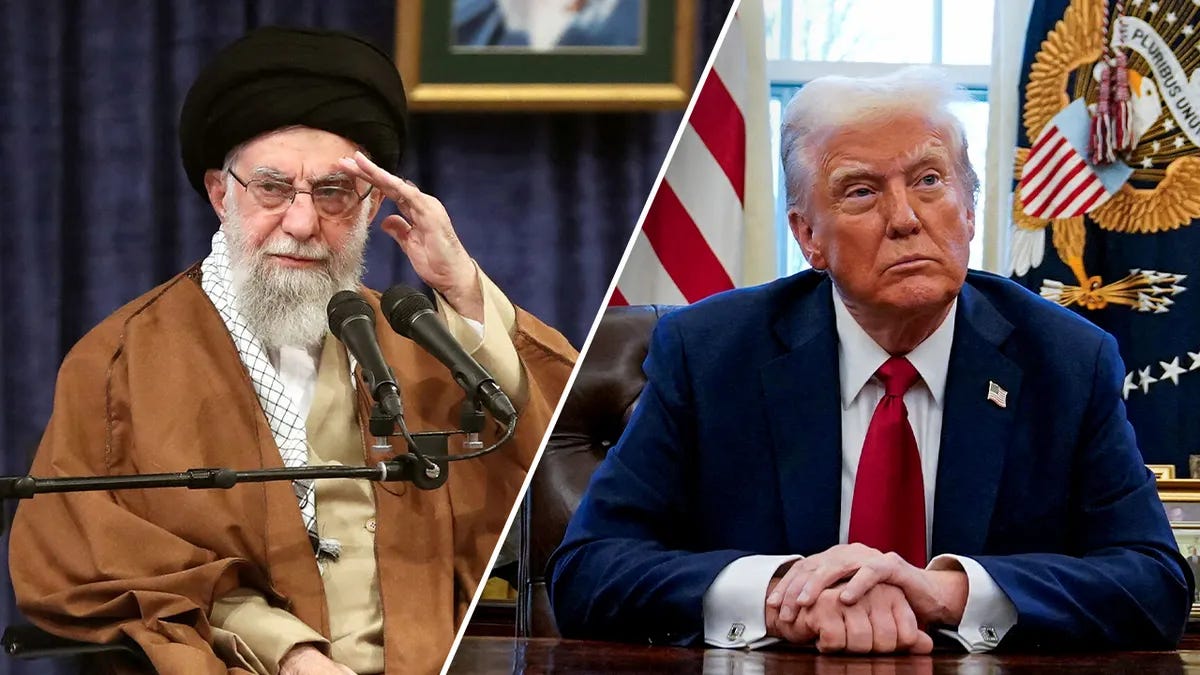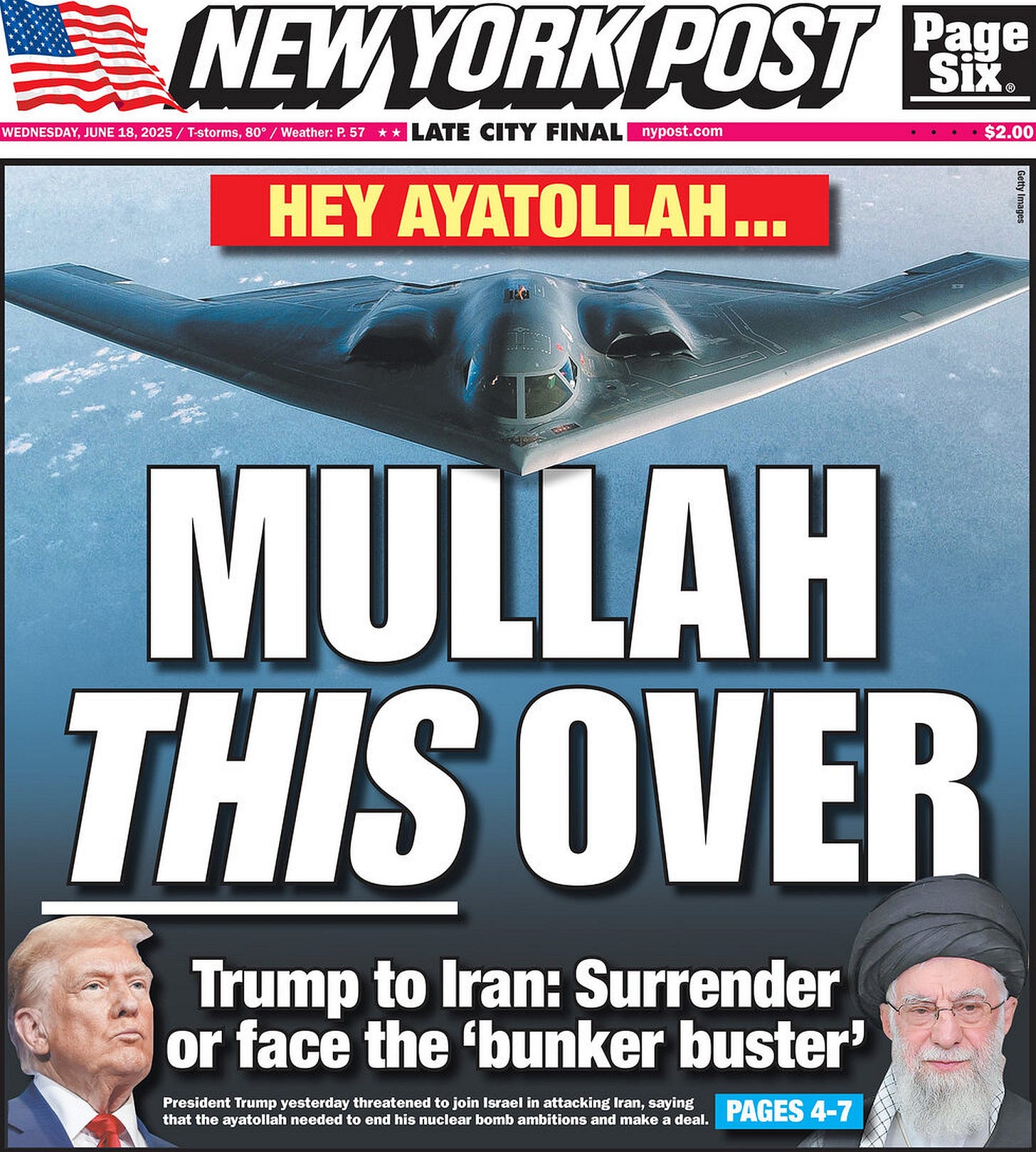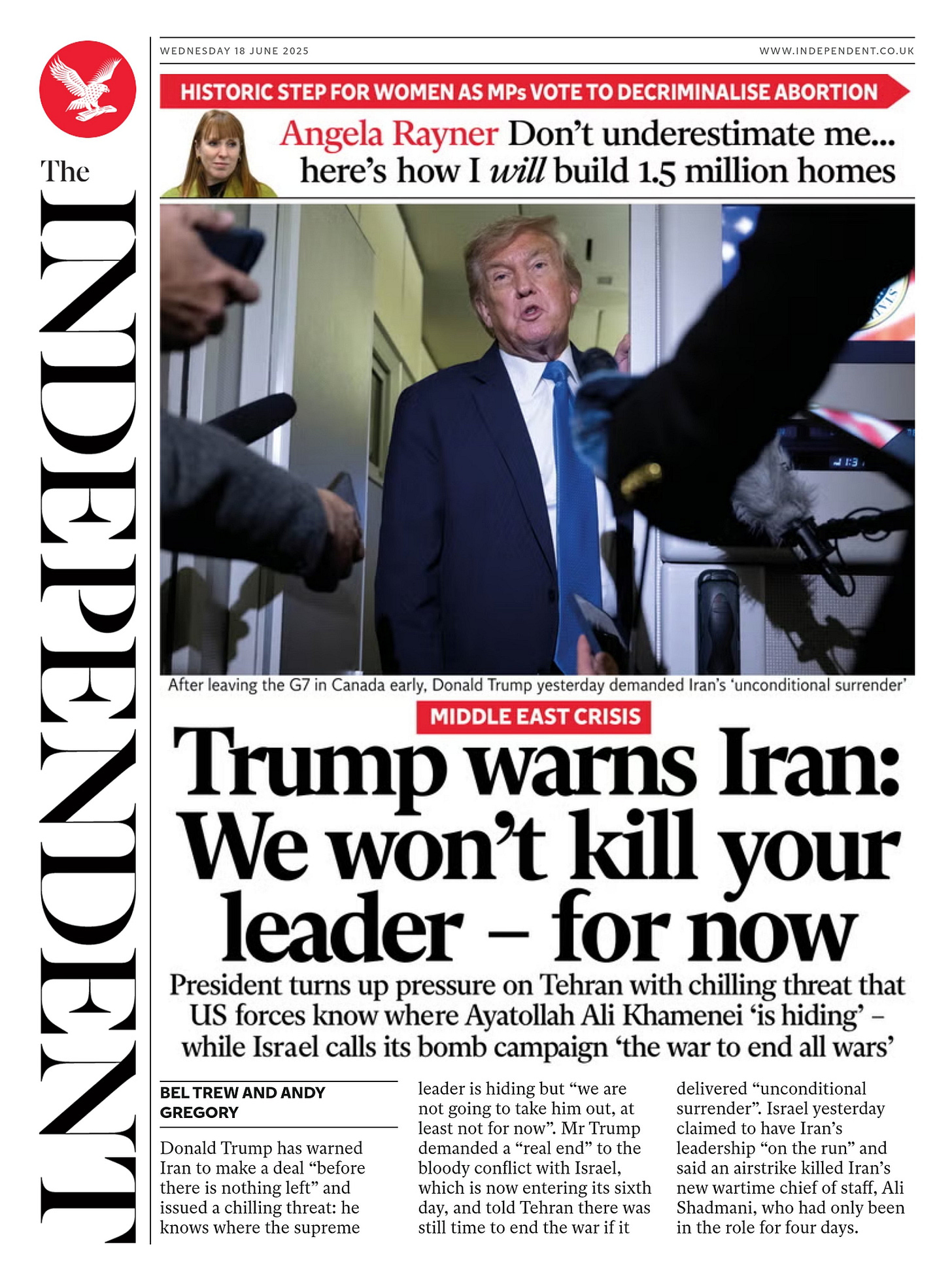Israel-Iran Conflict Escalates: Khamenei Warns U.S. as Trump Weighs Military Role
With nuclear sites under fire and regional tensions mounting, Iran’s supreme leader rejects U.S. ultimatums while Israel pushes for deeper U.S. involvement — raising fears of a broader Middle East war
Iran’s supreme leader, Ayatollah Ali Khamenei, on Wednesday dismissed President Trump’s threats and rejected his call for an “unconditional surrender,” adding to fears of a wider conflagration in the Middle East. “Intelligent people who know Iran, the nation and the history of Iran will never speak to this nation in the language of threats, because the Iranian nation cannot be surrendered,” he said in a televised statement, according to Iranian state media. “The Americans should know that any U.S. military intervention will undoubtedly be accompanied by irreparable damage.” His remarks on the sixth day of the war were a defiant response to Israel and to President Trump, who has suggested that the United States could join Israel’s bombing campaign against Iran’s nuclear program.
Trump says "I may do it, I may not do it", when asked about whether the US will join Israeli strikes on Iran. The US president adds: "Nobody knows what I want to do. But I can say this: Iran's got a lot of trouble and wants to negotiate"
Any potential U.S. military strike would likely have a much more devastating impact on Iran’s nuclear program than Israel can wreak alone, and Israel has been pressing for the U.S. military to assist its efforts. Mr. Trump has long maintained that he opposes getting involved in foreign wars and expressed hopes for a nuclear deal with Iran. But he said on Tuesday that “our patience is wearing thin.” Israel continued to pummel Iran on Wednesday afternoon, launching fresh strikes on Tehran. Earlier in the day, Israel’s military said more than 50 Israeli warplanes had attacked targets across the Iranian capital, including a nuclear centrifuge plant. The Iranian authorities did not immediately comment on the claims, though the U.N.’s nuclear watchdog said that two centrifuge production facilities had been hit. Iran fired about 30 ballistic missiles at Israel in two barrages after midnight and two waves of drones on Wednesday morning, but most of the missiles and all the drones were intercepted, Israel said. There were no immediate reports of casualties, and Iran’s missile salvos appeared to be limited compared with earlier attacks. As the Trump administration contemplates its next steps, the U.S. president seemed to suggest that the United States could enter the conflict against Iran. He used the word “we” while referring to Israeli military operations, and also cited the possibility of killing Ayatollah Khamenei. “We are not going to take him out (kill!), at least for now,” Mr. Trump wrote. Israel considers Iran’s nuclear program to be a threat to its survival. The Israeli military has struck and damaged some of Iran’s major nuclear sites since it started attacking the country on Friday, but lacks the capability to effectively hit the facilities at Fordo, the most important nuclear site, which lie deep underground. Prime Minister Benjamin Netanyahu of Israel wants the United States to drop its biggest bunker-busting bombs on Fordo. Mr. Trump and Mr. Netanyahu spoke on the phone on Tuesday, according to a Trump administration official who did not provide details - NYT
The escalating conflict between Israel and Iran is causing massive disruptions to air travel across the Middle East. On the ground today, I witnessed countless travellers — including Hajj pilgrims en route to Saudi Arabia — struggling with delays and cancellations. With airlines rerouting flights to avoid areas at risk of missile or drone attacks, journey times are increasing by several hours, adding to the chaos and frustration.
With Israeli air strikes showing no sign of slowing after five days, thousands are fleeing Tehran, creating traffic jams and fuel shortages as they head north seeking refuge in parts of the country they hope are safe. For many, that’s not far enough. Northern border crossings -- Iran shares borders in the region with Turkey and Azerbaijan as well as Armenia -- are being flooded with those seeking to leave Iran fearing no place inside the country is safe. In Agarak, on the Armenian side of the border with Iran, locals say the usual trickle has become a deluge. “No city is safe,” Amir Nikki told RFE/RL's Armenian Service, known locally as Radio Azatutyun, “because there are military and [Islamic] Revolutionary Guards [Corps installations] and weapons everywhere.” Nikki lives in the United Kingdom, but his family resides in the central city of Isfahan, close to the nuclear facilities that Israel says it is targeting in a bid to neutralize Iran’s nuclear program. Israel, and many of its Western allies, accuse Iran of seeking to build nuclear weapons. Tehran has vehemently rejected the accusations, saying its atomic program is purely for civilian purposes. Most Iranians crossing into Armenia -- both men and women -- avoided speaking on camera due to fear of possible repercussions from the Islamic regime. The majority of those escaping Iran appear to be women and elderly people. At the Agarak checkpoint, Armenian taxi drivers say they have been dealing with the flood of people by working in shifts throughout the day, offering transportation services to those entering the country and needing to go in different directions. They say it’s not only Iranians crossing the border. Many are citizens of other countries fleeing the war. RFE/RL’s Armenian Service correspondents on the ground reported seeing groups of Asian citizens among those entering Armenia. One predicted that, as the conflict between Israel and Iran continues to escalate, the number of people crossing into Armenia will “likely grow." - NYT
Hundreds of Chinese nationals have been evacuated from Iran while work is continuing to remove more than a thousand others amid the ongoing conflict with Israel. “As of now, under the organisation and coordination of the Ministry of Foreign Affairs and the Chinese embassy and consulates in Iran, and with the active assistance and support of neighbouring countries, 791 Chinese citizens have been relocated from Iran to safe areas, while over 1,000 more are in the process of being evacuated,” foreign ministry spokesman Guo Jiakun said on Wednesday. Guo said some Chinese citizens have also been evacuated from Israel without giving a number. He added that there had been no reports that any Chinese nationals had been killed or injured in the fighting, which started on Friday with a series of Israeli strikes on targets in Iran - SCMP
Iranian state television on Tuesday afternoon urged people to remove WhatsApp from their smartphones, alleging without specific evidence that the messaging app gathered user information to send to Israel. In a statement, WhatsApp said it was “concerned these false reports will be an excuse for our services to be blocked at a time when people need them the most.” WhatsApp uses end-to-end encryption, meaning a service provider in the middle can’t read a message. “We do not track your precise location, we don’t keep logs of who everyone is messaging and we do not track the personal messages people are sending one another,” it added. “We do not provide bulk information to any government.” End-to-end encryption means that messages are scrambled so that only the sender and recipient can see them. If anyone else intercepts the message, all they will see is a garble that can’t be unscrambled without the key - AP
Donald Trump says "I may do it, I may not do it", when asked about whether the US will join Israeli strikes on Iran. Watch my brief explainer from the region as the news broke.
The G7 Summit in Canada wrapped up with no final agreement on the war in Ukraine or a collective effort to pressure Moscow into ceasefire negotiations. Canada and other allies announced new Russian sanctions and aid for Ukraine on Tuesday, but the U.S. did not follow suit. A senior Canadian government official told reporters on background that the U.S. sought weaker language on Ukraine and Russia than what other members proposed, resulting in no joint statement being issued. The official said it was challenging to get the U.S. to agree on a statement on Ukraine in part because it’s trying to negotiate a ceasefire or peace deal between Russia and Ukraine. They added Canada planned to use the stronger language agreed to by the other leaders in its closing chair’s statement, which does not require consensus and will be released late Tuesday - Global News
Ukrainian emergency workers pulled more bodies from the rubble of destroyed Kyiv apartment buildings hit by Russian missile and drone strikes, as the death toll in the Ukrainian capital rose to 24 people, according to the State Emergency Service. Workers with search dogs and heavy construction equipment picked through debris on June 18 looking for more survivors of the attack one day earlier -- one of the largest on Kyiv in years. More than 150 people in Kyiv and elsewhere were wounded in the June 17 barrage, emergency services said, which also hit Odesa, killing at least two people in the Black Sea port.
India's Prime Minister Narendra Modi told U.S. President Donald Trump late on Tuesday that a ceasefire between India and Pakistan after a four-day conflict in May was achieved through talks between the two militaries and not U.S. mediation, India's senior-most diplomat said. Trump had said last month that the nuclear-armed South Asian neighbours agreed to a ceasefire after talks mediated by the U.S., and that the hostilities ended after he urged the countries to focus on trade instead of war. India has previously denied any third-party mediation and Tuesday's phone call between Modi and Trump on the sidelines of the G7 summit in Canada, which Modi attended as a guest, is their first direct exchange since the May 7-10 conflict. "PM Modi told President Trump clearly that during this period, there was no talk at any stage on subjects like India-U.S. trade deal or U.S. mediation between India and Pakistan," Indian Foreign Secretary Vikram Misri said in a press statement. "Talks for ceasing military action happened directly between India and Pakistan through existing military channels, and on the insistence of Pakistan. Prime Minister Modi emphasised that India has not accepted mediation in the past and will never do," he said - Reuters
British and American tourists could pay higher fees to enter the EU under a plan to boost the bloc’s tax revenues. The EU is considering taxing foreign travelers to pay back part of the €350 billion common debt that was issued to finance its recovery from the Covid-19 pandemic in 2021. The potential new levy would be a particular hit to British tourists who already face longer passport queues and more restrictions to enter Europe as a result of Brexit. The move may also stymie the recent post-Brexit thaw between London and Brussels, which has seen the EU offer smoother passport controls and less red tape for British travelers. Nevertheless, raising the EU’s entry fee above the currently proposed €7 fee that comes as part of the bloc’s new European Travel Information and Authorisation System, or ETIAS, scheme is emerging as one of the most popular tax options ahead of the European Commission’s formal budget proposal on July 16, several diplomats told POLITICO. ETIAS is set to apply to 60 countries that have visa-free agreements with the EU, including the U.S. and U.K., from the last quarter of 2026 onward. Any further increase in the fee would similarly apply to the same cohort of countries - Politico





